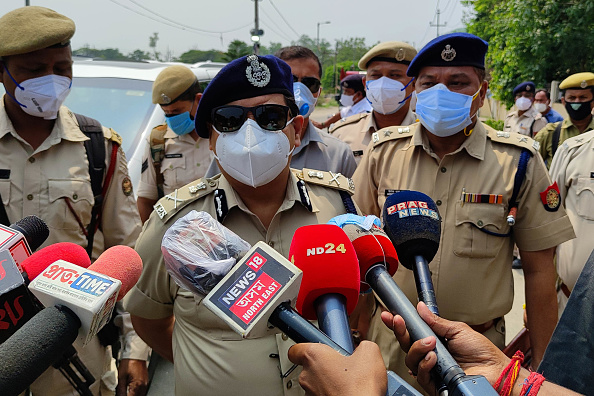
Editor's note: Stephen Ndegwa is a Nairobi-based communication expert, lecturer-scholar at the United States International University-Africa, author and international affairs columnist. The article reflects the author's opinions, and not necessarily the views of CGTN.
In a global village like we are living in, the role of the media in shaping the world's social, economic and political destiny cannot be overemphasized. Further, media has become an invaluable part of society with the proliferation of the digitally driven social media.
Anyone with the ubiquitous mobile phone can now play the role of a newsmaker simply by use of a camera. The new dispensation has also created the "fake news" phenomenon where people conjure up pieces of misinformation and disinformation at the behest of ignoble interests or just for mischief.
The foregoing scenario has perpetuated the information gap between those who have the means to verify the veracity of information on one hand, and those who cannot know the truth on the other due to technological or intellectual challenges. If information is power, then those who do not know the truth are powerless.
Similar to China's mantra of a common destiny for mankind and leaving no one behind, the United Nations Educational, Scientific and Cultural Organization (UNESCO) came up with "Information as a Public Good" as the theme for World Press Freedom Day 2021 (WPFD).
Indeed, contrary to the combative approach in previous years' celebrations marking the WPFD, there is a marked departure to a spirit of positive engagement between the media and the powers that be. The aggressive fighting for space by the Fourth Estate has aggravated tensions with the three institutions of governance – the Legislature, Judiciary and Executive – as each needlessly fortifies its stronghold.
In economics, a public good is a commodity or service that is universally available in the same category of essential services like water and power. A public good is all-inclusive with everyone holding equal rights to its access and use. Thinking of media in this way is revolutionary thinking away from the current model of over-commercialization of news and information.
In other words, the message is that the media should not be used by powerful forces as a weapon of hegemony. Developing countries have for long borne the blunt of those whose sole objective is to keep them in a dearth of information for covert reasons. The Western media has been accused of manipulating and hiding valuable information for their selfish interests.

Director General of Assam Police Bhaskar Jyoti Mahanta interacts with the media after visiting a counting station for the Assam state legislative assembly elections at Amingaon in Kamrup district of Assam, India, May 2, 2021. /Getty
Director General of Assam Police Bhaskar Jyoti Mahanta interacts with the media after visiting a counting station for the Assam state legislative assembly elections at Amingaon in Kamrup district of Assam, India, May 2, 2021. /Getty
Today there is a constant battle between form and content, with overlaps that distort reality. There are many gray areas in the reporting of different situations and events depending on which media house one reads or sees the script. The media has also created a post-truth society where, according to scholars Thomas P. Mackey and Neal-Schuman, "objective facts are less influential in shaping public opinion than appeals to emotion and personal belief."
So, how can the media play its rightful role of safeguarding and promoting issues that affect humanity? One, the media should be a channel of peace. In many cases of serious conflict, the media has always been fingered as one of the catalysts. This is caused by the misuse of media channels by competing political and commercial interests.
As a tool for development, the media should also promote innovation by sharing transformational and aspirational ideas. For example, recent coverage of Mars expeditions has motivated the human spirit that it can overcome even seemingly insurmountable challenges. Whatever is happening in China and the U.S. in this quest feels like a conquest for humanity.
It is the kind of perspective that the media should use in addressing the current challenge of the COVID-19 pandemic. Responsibility means that the media should be truthful and avoid publishing conspiracy theories that create rifts and interfere with efforts aimed at mobilizing everyone against the pandemic.
Of course, the safety and security of journalists cannot pass without mention. By virtue of their oftentimes sensitive work, journalists live risky lives both in public and private. Journalists sometimes come across very sensitive information whose dissemination may destroy people's careers and private lives, or companies and organizations. This makes them prone to compromise or elimination by diabolical forces opposed to the truth.
However, journalists must also play by the rules and code of ethics of the profession. Regardless of the technological advances and cultural changes taking place around the world, adherence to the basic principles of truthfulness, accuracy, objectivity, impartiality, fairness and public accountability remains a cardinal responsibility.
The media needs to move from the profit-driven "man bites dog" narratives to human cantered and human interest stories of love, struggle and conquest. The media holds frequencies in trust for humanity, even as it pays a premium for it. Therefore, those trusted with the privilege must seek to create understanding between people from all corners of the globe and lead to the much desired community with a shared future for mankind.
(If you want to contribute and have specific expertise, please contact us at opinions@cgtn.com)

